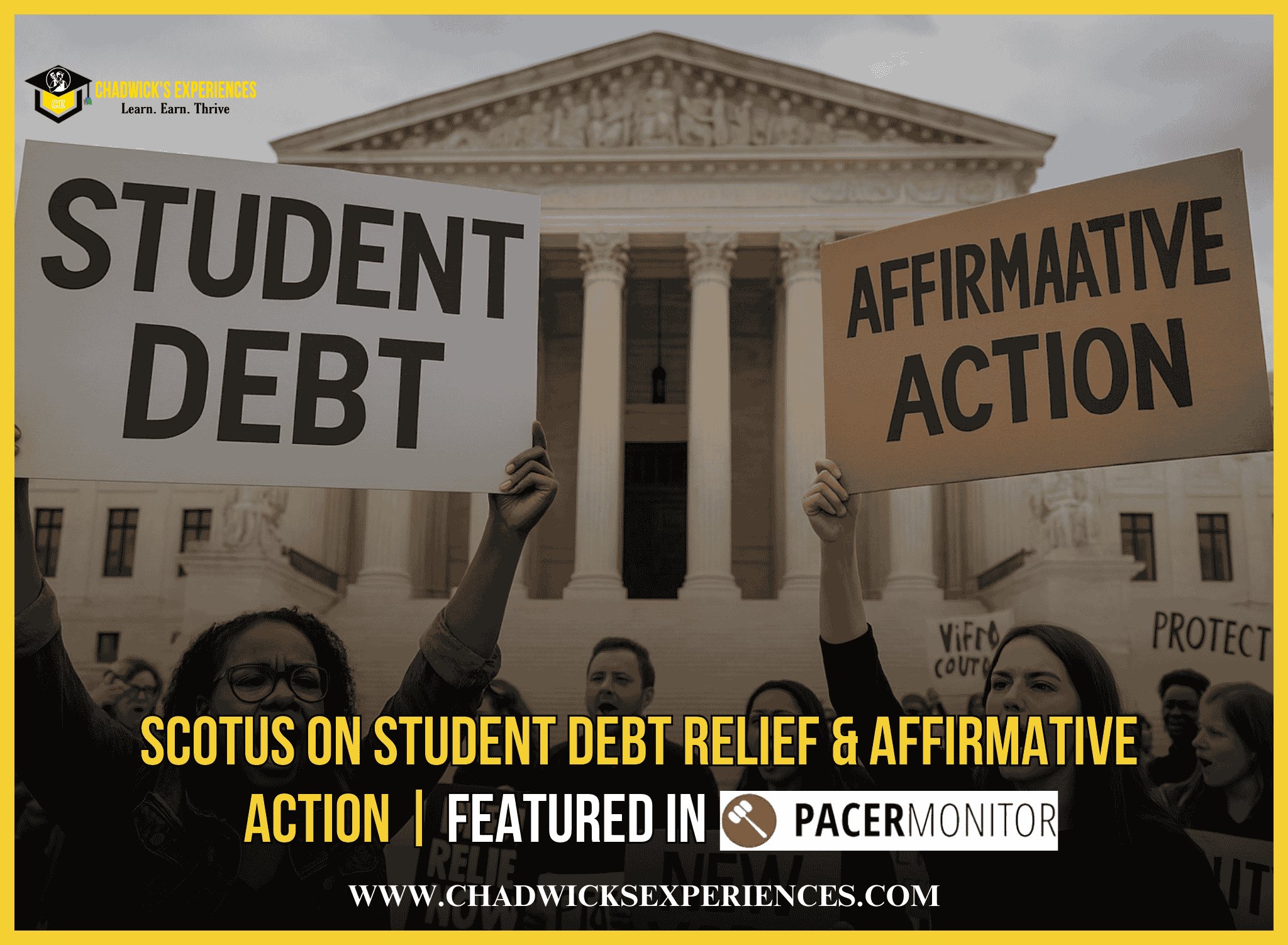
Title:
SCOTUS Reviews of Admission Quotas, Debt Relief Touch Racial Raw Nerve: High Court Examines Policies That Help Black Americans
By Juliette Fairley
Published: December 9, 2022 | PacerMonitor
Introduction
When Charles Chadwick went to college, he used student loans and scholarship money to finance his degree in mass communications. After graduating in 2010, he owed $18,000 in student loan debt, which he has since paid off.
“I worked hard,” he said. “I doubled up on payments to cut the interest.”
Although he won’t benefit from President Joe Biden’s debt forgiveness program, Mr. Chadwick thinks those who are applying for relief need lots of luck.
“The president cannot cancel debt like that based off the laws,” said Mr. Chadwick, who wrote the book Chadwick’s College Checklist. “I signed a Master Promissory Note like everyone else, and you can’t get a loan without signing that document.”
Read the Full Article (Original PDF)
View the archived original publication below:
The Student Debt Divide
Chadwick is among the 90% of Black graduates who have taken out student loans to pay for college, compared with 66% of whites, according to a Bankrate study.
“Proportionally, Black students have more debt, so it would be beneficial for us,” said Dr. Malik Edwards, a constitutional law professor at the North Carolina Central University School of Law.
Student loan debtors nationwide will know by June whether up to $20,000 will be canceled for qualified borrowers now that the U.S. Supreme Court granted the Petition for Writ of Certiorari submitted by a coalition of Attorneys General challenging Biden’s administrative order.
The six attorneys general, from Nebraska, Missouri, Arkansas, Iowa, Kansas, and South Carolina, allege in their original complaint filed in the U.S. District Court for the Eastern District of Missouri that interest income on more than $400 billion in federal student loan debt will be lost to states nationwide if the perk is allowed to proceed.
“Money for the state goes into allocations they have like infrastructure or education and so states would have to re-shift their resources accordingly,” said Israel Klein, an attorney with the Pardalis & Nohavicka law firm in New York.
Affirmative Action Under Fire
The nation’s highest court is also weighing the statutory and constitutionality of affirmative action college admissions programs in Students for Fair Admissions v. Harvard and Students for Fair Admissions v. University of North Carolina.
College admissions programs based on race became permissible to help students of color gain access to top schools. UNC, for example, did not accept Black student applicants until the 1950s.
“Across these legal cases, there is an attack on the capacity to create more inclusive opportunities for Blacks,” said Sandy Darity, a professor of economics and public policy at Duke University.
A ruling against quotas would likely discourage universities from racial balancing.
“It will make schools think twice when they pick their undergraduate candidates in terms of whether they can afford the school and whether their merit can earn them financial aid so it’s not free tickets for college admissions,” said Wenyuan Wu, executive director of Californians for Equal Rights Foundation (CFER).
Critics of affirmative action like CFER and Students for Fair Admissions view attempts to amend historical wrongs as discrimination against non-Black students.
“The purpose of the 14th Amendment was to remediate and specifically give full citizenship to African-Americans, but the current U.S. Supreme Court doesn’t agree,” Dr. Edwards told PacerMonitor News.
Native American Programs and Loopholes
Alleged inconsistencies emerged when the University of California announced its Native American Opportunity Plan.
Although the UC scholarship favors Native American students, it has yet to be challenged in court.
“The theory is that tribes are political groups, which is an allegedly exempt category for discrimination of this sort,” said Tom Fitton, president of Judicial Watch.
Both Judicial Watch and CFER filed amicus briefs in support of Students for Fair Admissions.
“Judicial Watch and similarly situated folks have been playing a long game, and the U.S. Supreme Court is currently where they need it to be so they’re going to challenge as much as they can,” Dr. Edwards said.
Looking Ahead
If the Supreme Court abolishes both affirmative action and Biden’s student loan debt relief in 2023, organization among students and university leaders is likely—similar to the mobilization that followed the reversal of Roe v. Wade.
“There are a whole bunch of folks who have this idolized view of 1950s America,” Dr. Edwards added. “That’s what they’re trying to work back to.”
Source Note
Originally featured in PacerMonitor (now defunct). Republished here for archival and educational purposes.

